- Learning time
- 10 minutes
- First play time
- 20 minutes
Air, Land, and Sea
Designed by: Jon Perry
Air, Land, and Sea is a two player micro game with a grand military theme.
Players are battling for supremacy in three theatres, the Air, Land and Sea of the title, using battle cards from a deck of 18; 6 cards for each theatre numbered 1 to 6, representing strength.
At the beginning of a game, the three theatre cards are laid between the players across the table in a random order, and starting player is established by players taking one of the two face down supreme commander cards (in subsequent battles players switch).
A game is made up of a number of battles. In each battle, the players are dealt six cards each, and the remainder put to one side. Players take turns adding cards to their side of each theatre, until all cards are played; the player with superior strength in at least two theatres wins the battle (ties go to player one) and gains 6vps. Cards are shuffled back into the deck, the order of the three theatre cards is rotated and a new battle ensues. Play continues until one player has 12vps – this wins them the game.
So it’s a best of three? Well not quite, because at the beginning of a player’s turn, if she/he feels the battle is lost, they can withdraw. Their opponent automatically wins, but not necessarily the full 6vp – an amount depending on the number of cards the withdrawing player has left in hand. This adds an interesting tactical wrinkle – can you convince your opponent you can win even when you’re not sure, causing them to withdraw from the fight.
Normally during a battle, cards can only be played to their matching theatre. However cards can also be played face down to any theatre (all face down cards have a strength of 2). Crucially, all the cards played face up have a special ability, either instant or ongoing, and these can affect where subsequent cards are played, allow drawing from the remaining deck, changing the value of cards already played etc. One of the most important abilities is flipping an open card (one without a card played over it). This might mean flipping a card face down, or flipping it face up, in which case its ability immediately triggers.
Despite its very few components (not all of which even feature in any given battle), Air, Land, And Sea manages to create an intricate web of causes and effects, along with some double-think and bluffing to boot; it all adds up to a very satisfying 20 minute game for two would-be military masterminds.
Joe says
There's a modern trend for 2 player card games containing just 18 cards. Why 18, I'm not sure, but on the evidence of a lot of the ones I've played and enjoyed, there's something magical about that number. Air, Land, and Sea (Oxford comma and all) is another successful entry in the canon. I can be put off by cards featuring powers that affect other cards, as it's hard to make a mental picture of how they all fit together and interact. But when there are relatively few to internalise, I'm happy to give it a try. And in any case the process of internalising them isn't sitting down with a rule sheet and memorising them, it's a natural consequence of repeated playing - which is easy to achieve when a game only takes 20 minutes. There's a limit to the amount of grand strategy that can be invoked here, and I tend to like games where I have to think tactically and react; so far, I've found AL&S to be a great fit for me. The withdraw option hasn't been used much by me or my opponents - but far from it feeling like an unnecessary addition, I have a feeling it will really come into it's own when we better understand the interactions of the cards, and can make a better call on whether it's worth trying to hold on for a final card reversal of fortune.
The guru's verdict
-
Take That!
Take That!
It's a two-player conflict game, and the final card plays can sometimes pull the rug out from under the likely winner.
-
Fidget Factor!
Fidget Factor!
No significant down time, though the order in which to play your cards can be agonising.
-
Brain Burn!
Brain Burn!
The maths is extremely simple - the potential ramifications of each card-play less so. The 18 cards feature 16 unique abilities - but memorising them would be a natural consequence of repeated play rather than something that needs to be done in order to enjoy the game.
-
Again Again!
Again Again!
As you get to know the cards, the gameplay will only get deeper and more interesting - there's a lot of play in those few cards.

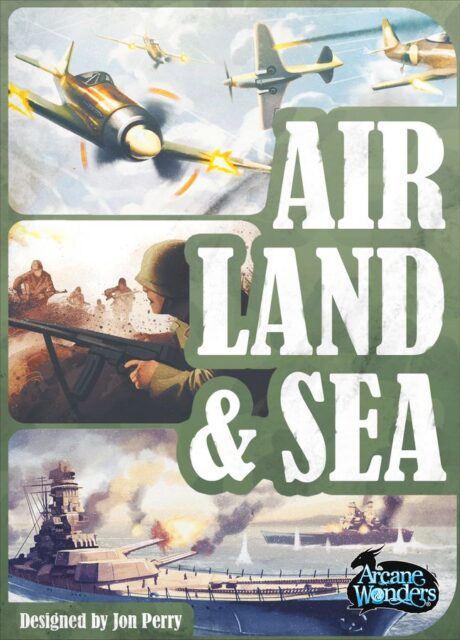

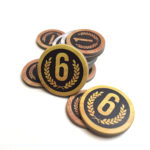
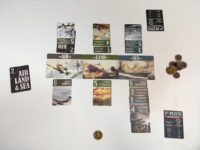
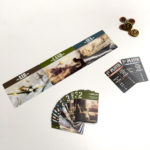
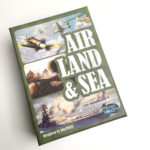


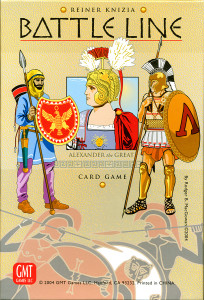

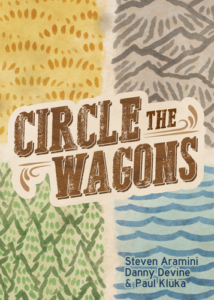

Sam says
I'm always wary of text-on-cards games because - as I've no doubt extrapolated elsewhere on the site - I can sometimes feel like I'm playing a rulebook rather than a game. As Joe says below, sometimes the shifting parameters of possibilities can cause my brain to start to melt. Even with only 18 cards Air, Land, and Sea has the capacity to make you stop and think. But with only six cards to play in every battle, decisions feel manageable, and as well as the tactical play here of one card affecting another I like the hidden knowledge of each player not being entirely sure what their opponent has. If Love Letter remains for me the pinnacle of the fun and silly microgame, Air, Land, and Sea is certainly in the running for the tactical-warfare nomination.